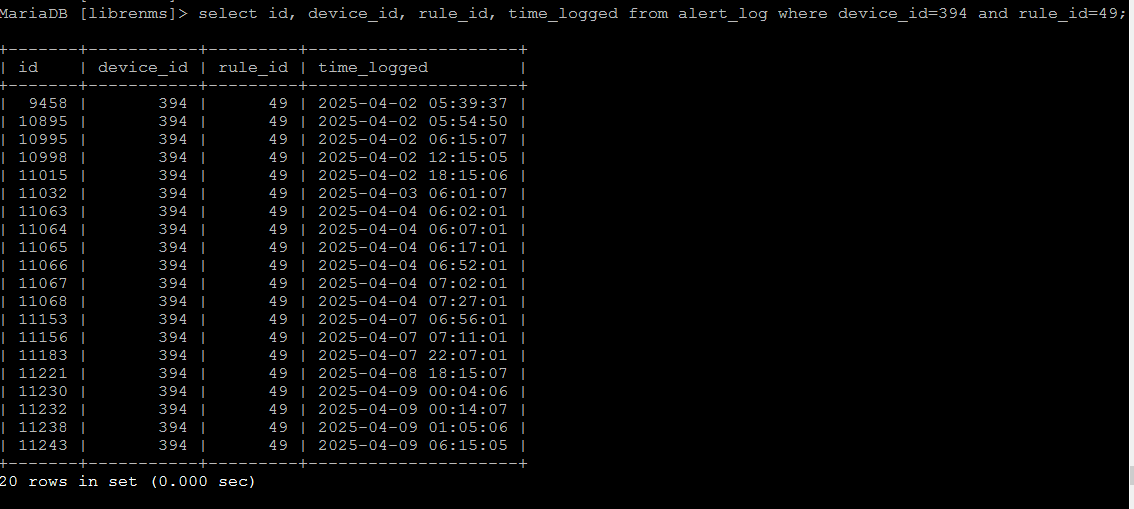I have configured LibreNMS to use Alertmanager as the alert transport for sending alerts to a webhook.
I’ve noticed that whenever an alert transitions to “got better” or “got worse,” the unique ID field appears empty. Could you confirm if this is the expected behavior, or if it might be a potential bug?
/opt/librenms $ ./validate.php
| Component | Version |
|---|---|
| LibreNMS | 23.11.0 (2023-11-25T19:17:34+00:00) |
| DB Schema | 2023_11_04_125846_packages_increase_name_column_length (273) |
| PHP | 8.1.22 |
| Python | 3.10.13 |
| Database | MariaDB 10.5.24-MariaDB-1:10.5.24+maria~ubu2004 |
| RRDTool | 1.7.2 |
| SNMP | 5.9.3 |
| =========================================== |
[OK] Installed from the official Docker image; no Composer required
[OK] Database connection successful
[OK] Database Schema is current
[OK] SQL Server meets minimum requirements
[OK] lower_case_table_names is enabled
[OK] MySQL engine is optimal
[OK] Database and column collations are correct
[OK] Database schema correct
[OK] MySQl and PHP time match
[OK] Active pollers found
[OK] Dispatcher Service is enabled
[OK] Locks are functional
[OK] No python wrapper pollers found
[OK] Redis is functional
[OK] rrd_dir is writable
[OK] rrdtool version ok
[WARN] Updates are managed through the official Docker image
Alert Template::::::::::::
Port HighUtilization---->
@php
// Custom query to fetch id from the alerts table based on device_id and timestamp
$customAlertId = DB::table(‘alerts’)
->where(‘device_id’, $alert->device_id)
->where(‘timestamp’, $alert->timestamp)
->value(‘id’);
@endphp
@if ($alert->state == 0)Time elapsed: {{ $alert->elapsed }} @endif
Timestamp: {{ $alert->timestamp }}
Unique-ID: {{ $customAlertId }}
@if ($alert->faults) Faults:
@foreach ($alert->faults as $key => $value)
#{{ $loop->iteration }}: class_name: “Port”
specific_Problem: “HighUtilization”
instanceName: {{ $value[‘hostname’] }}/{{ $value[‘ifIndex’] }}
hostName: {{ $value[‘hostname’] }}
ipAddress: {{ $value[‘ip’] }}
severity: {{ $alert->severity }}
description: “Port HighUtilization for {{ $value[‘hostname’] }}/{{ $value[‘ifName’] }}”
@endforeach
@endif
Alert Rule:::::::::::::
Other PortUtilization OverThreshold---->
macros.port_up = 1 AND ports.ifType != “ethernetCsmacd” AND devices.os = “junos” AND (macros.port_in_usage_perc >= 90 OR macros.port_out_usage_perc >= 90)
JSONs:
below are the alert jsons taken from alert manager:
{
“annotations”: {
“description”: “Timestamp: 2025-04-02 08:26:03\nUnique-ID: \n Faults:\n #1: class_name: "Port"\n specific_Problem: "HighUtilization"\n instanceName: brmnc01xxxxxxxxxxxxxxxxxx/800\n hostName: brmnc01xxxxxxxxxxxxxxxxxx\n ipAddress: 10.65.xx.xx\n severity: warning\n description: "Port HighUtilization for brmnc01xxxxxxxxxxxxxxxxxx/irb.1052"\n #2: class_name: "Port"\n specific_Problem: "HighUtilization"\n instanceName: brmnc01xxxxxxxxxxxxxxxxxx/802\n hostName: brmnc01xxxxxxxxxxxxxxxxxx\n ipAddress: 10.65.xx.xx\n severity: warning\n description: "Port HighUtilization for brmnc01xxxxxxxxxxxxx/irb.1054"\n”,
“summary”: “Other PortUtilization OverThreshold”,
“title”: “Alert for device brmnc01xxxxxxxxxxxxxx - Other PortUtilization OverThreshold got worse”
},
“endsAt”: “2025-04-03T08:28:28.309Z”,
“fingerprint”: “ba9b41c694334a64”,
“receivers”: [
{
“name”: “alertmanager”
}
],
“startsAt”: “2025-04-02T08:02:04.000Z”,
“status”: {
“inhibitedBy”: ,
“silencedBy”: ,
“state”: “active”
},
“updatedAt”: “2025-04-02T08:28:28.309Z”,
“generatorURL”: “http://localhost/device/822”,
“labels”: {
“alertname”: “Other PortUtilization OverThreshold”,
“instance”: “brmnc01xxxxxxxxxxxxxxxxx”,
“severity”: “warning”,
“source_dns”: “dyxinxxxxxxxxxxxxxxxx”,
“source_type”: “librenms”
}
},
{
“annotations”: {
“description”: “Timestamp: 2025-04-01 21:34:03\nUnique-ID: \n Faults:\n #1: class_name: "Port"\n specific_Problem: "HighUtilization"\n instanceName: sbknc01xxxxxxxxxxxxxxxxxxx/690\n hostName: sbknc01xxxxxxxxxxxxxxxxxxx\n ipAddress: 10.65.xx.xx\n severity: warning\n description: "Port HighUtilization for sbknc01xxxxxxxxxxxxxxxxxxx/irb.1009"\n #2: class_name: "Port"\n specific_Problem: "HighUtilization"\n instanceName: sbknc01xxxxxxxxxxxxxxxxxxx/691\n hostName: sbknc01xxxxxxxxxxxxxxxxxxx\n ipAddress: 10.65.xx.xx\n severity: warning\n description: "Port HighUtilization for sbknc01xxxxxxxxxxxxxxxxxxx/irb.1010"\n #3: class_name: "Port"\n specific_Problem: "HighUtilization"\n instanceName: sbknc01xxxxxxxxxxxxxxxxxxx/692\n hostName: sbknc01xxxxxxxxxxxxxxxxxxx\n ipAddress: 10.65.xx.xx\n severity: warning\n description: "Port HighUtilization for sbknc01xxxxxxxxxxxxxxxxxxx/irb.1011"\n #4: class_name: "Port"\n specific_Problem: "HighUtilization"\n instanceName: sbknc01xxxxxxxxxxxxxxxxxxx/696\n hostName: sbknc01xxxxxxxxxxxxxxxxxxx\n ipAddress: 10.65.xx.xx\n severity: warning\n description: "Port HighUtilization for sbknc01xxxxxxxxxxxxxxxxxxx/irb.1045"\n #5: class_name: "Port"\n specific_Problem: "HighUtilization"\n instanceName: sbknc01xxxxxxxxxxxxxxxxxxx/697\n hostName: sbknc01xxxxxxxxxxxxxxxxxxx\n ipAddress: 10.65.xx.xx\n severity: warning\n description: "Port HighUtilization for sbknc01xxxxxxxxxxxxxxxxxxx/irb.1061"\n #6: class_name: "Port"\n specific_Problem: "HighUtilization"\n instanceName: sbknc01xxxxxxxxxxxxxxxxxxx/815\n hostName: sbknc01xxxxxxxxxxxxxxxxxxx\n ipAddress: 10.65.xx.xx\n severity: warning\n description: "Port HighUtilization for sbknc01xxxxxxxxxxxxxxxxxxx/irb.1052"\n #7: class_name: "Port"\n specific_Problem: "HighUtilization"\n instanceName: sbknc01xxxxxxxxxxxxxxxxxxx/817\n hostName: sbknc01xxxxxxxxxxxxxxxxxxx\n ipAddress: 10.65.xx.xx\n severity: warning\n description: "Port HighUtilization for sbknc01xxxxxxxxxxxxxxxxxxx/irb.1054"\n #8: class_name: "Port"\n specific_Problem: "HighUtilization"\n instanceName: sbknc01xxxxxxxxxxxxxxxxxxx/822\n hostName: sbknc01xxxxxxxxxxxxxxxxxxx\n ipAddress: 10.65.xx.xx\n severity: warning\n description: "Port HighUtilization for sbknc01xxxxxxxxxxxxxxxxxxx/irb.1238"\n #9: class_name: "Port"\n specific_Problem: "HighUtilization"\n instanceName: sbknc01xxxxxxxxxxxxxxxxxxx/823\n hostName: sbknc01xxxxxxxxxxxxxxxxxxx\n ipAddress: 10.65.xx.xx\n severity: warning\n description: "Port HighUtilization for sbknc01xxxxxxxxxxxxxxxxxxx/irb.1239"\n”,
“summary”: “Other PortUtilization OverThreshold”,
“title”: “Alert for device sbknc01xxxxxxxxxxxxxxxxxxx - Other PortUtilization OverThreshold got better”
},
“endsAt”: “2025-04-02T21:36:53.129Z”,
“fingerprint”: “1bd62fa8b41df52b”,
“receivers”: [
{
“name”: “alertmanager”
}
],
“startsAt”: “2025-04-01T21:05:04.000Z”,
“status”: {
“inhibitedBy”: ,
“silencedBy”: ,
“state”: “active”
},
“updatedAt”: “2025-04-01T21:36:53.129Z”,
“generatorURL”: “http://localhost/device/402”,
“labels”: {
“alertname”: “Other PortUtilization OverThreshold”,
“instance”: “sbknc01xxxxxxxxxxxxxxxxxxx”,
“severity”: “warning”,
“source_dns”: “dyxinfxxxxxxxxxxxx”,
“source_type”: “librenms”
}
},




